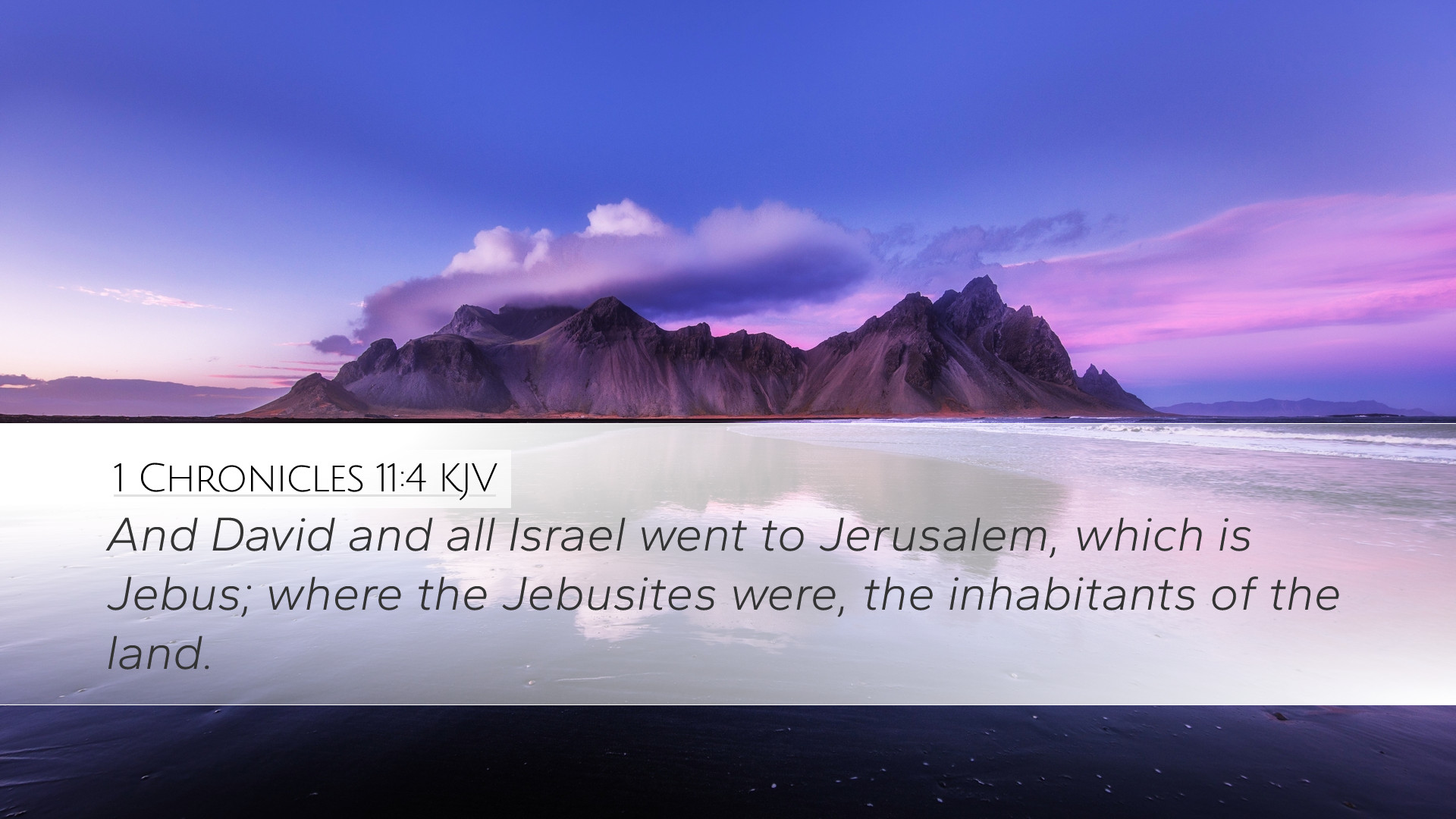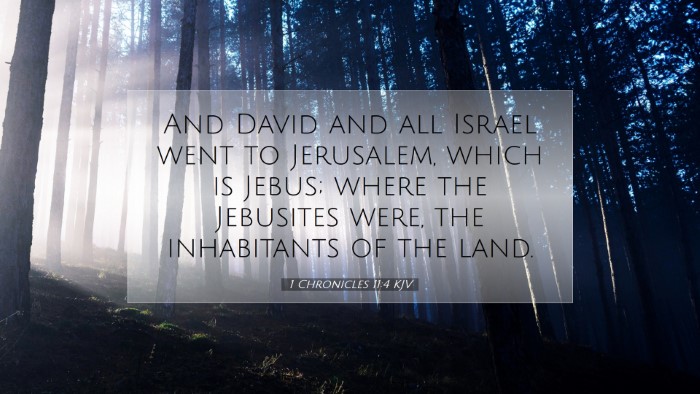Commentary on 1 Chronicles 11:4
Verse Reference: 1 Chronicles 11:4
Text: "And David and all Israel went to Jerusalem, which is Jebus: where the Jebusites were, the inhabitants of the land."
Introduction
The verse under discussion marks a significant transition in the narrative of Israel's monarchy. It portrays David's intent and determination to conquer Jerusalem, which was then a stronghold of the Jebusites. This commentary aims to synthesize insights from notable public domain commentaries to draw deep theological and historical meanings applicable to various audiences such as pastors, students, and scholars.
Historical Context
The city of Jerusalem, known as Jebus before its conquest, held strategic value due to its elevated position, natural defenses, and central location in Israel. Matthew Henry highlights that "Jebus was a city of great strength, and it was thought to be impregnable." David's resolve to capture this citadel represented both a military challenge and a spiritual necessity to unite the tribes of Israel under one king and one capital.
Jebus: A Stronghold of Iniquity
The Jebusites, as noted by Adam Clarke, were idolators and enemies of Israel, embodying the moral decay that often accompanies a life lived apart from God. Their worship and practices were an affront to Yahweh, the God of Israel. Thus, the taking of Jerusalem can be seen as a restoration of holy living and governance.
The Leadership of David
David's leadership is a crucial element in this passage. Albert Barnes reflects on David's role, suggesting that he was divinely appointed to bring the nation to its peak of political and spiritual unity. David's courage and faith, combined with his recognition of God's sovereignty, emphasize the importance of righteous leadership in achieving God’s purposes for His people.
Unity of Israel
The mention of "all Israel" signifies the collective effort in this endeavor. David was not merely seeking personal glory but understanding his position as representing the whole of the nation. This communal aspect draws attention to the theology of unity in the pursuit of God's objectives, reinforcing the idea that leadership must inspire collective participation.
Theological Implications
This verse serves as a precursor to the establishment of Jerusalem as the capital of Israel and as a site of future worship. The theological implications are profound, representing Christ as the ultimate king who would establish an eternal kingdom. The conquest of Jebus can be interpreted as Christ’s victory over sin, illustrating God's relentless pursuit to reclaim what was lost.
Symbolism of Jerusalem
Jerusalem often symbolizes God's chosen place for His people, a tangible representation of His presence among them. The transition from a city of the Jebusites to the City of David marks a pivotal moment in salvation history. Henry posits that Jerusalem became the seat of divine blessings, serving as a crucial backdrop for the unfolding narrative of redemption.
Practical Applications
For modern-day readers, this passage is rich with applications. Leaders in various spheres are encouraged to reflect on David's example of commitment and faithfulness to God's calling, especially in challenging situations. The verse prompts an examination of how one might approach the "strongholds" in their life—issues that appear insurmountable.
Emphasis on Faith
- Faith in the Face of Adversity: Just as David faced a fortified city, so too do believers confront challenges that require unwavering trust in God.
- Leadership and Community Engagement: David's leadership underlines the importance of including and inspiring others in the pursuit of collective goals.
- Cleansing of Idolatry: Reflect on what "Jebus" symbols exist in contemporary life and how the faithful can seek to cleanse themselves and their communities of such influences.
Conclusion
In sum, 1 Chronicles 11:4 is not just about a historical event; it encapsulates essential themes of leadership, unity, faith, and divine purpose. It invites pastors, students, theologians, and scholars to delve deeper into the significance of David's undertaking, the implications for the Jewish faith and practice, and the general lessons for life today. In confronting our own "Jebusites," may we be emboldened by the account of David and focused on the ultimate victory God grants through Christ.


